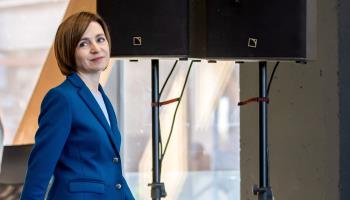The first round of the presidential election and the referendum on EU integration were close-run affairs
President Maia Sandu will face independent candidate Alexandr Stoianoglo in a presidential run-off on November 3, two weeks after Sandu’s referendum to promote EU accession passed by the narrowest of margins. Stoianoglo, supported by the opposition Socialists, performed better than expected in the first round. Diaspora votes tipped the referendum in Sandu’s favour but underscored the limits of Chisinau’s efforts to curb Moscow’s electoral influence.
What next
Subsidiary Impacts
- The referendum results show that malign external influences and internal polarisation might undermine democratic processes.
- Sandu’s failure to win in the first round allows the majority of opposition forces to mobilise against her candidacy in the second round.
- The pace of EU integration is likely to be slow, regardless of the election outcome.
Analysis
On October 20, presidential elections and a referendum were held in parallel (see MOLDOVA: Election results reveal narrow shift to EU – October 21, 2024). Of the eleven candidates who participated in the elections, Sandu and Alexandr Stoianoglo, a former general prosecutor, received the most votes. However, as neither achieved a majority, the pair will proceed to a second round to be held on November 3.
Election results
According to the Central Election Commission data, turnout was 51%. Of the 1,562,705 people who cast a vote, 240,548 did so from abroad. Sandu won 42.5% of the vote (656,355 votes), with Stoianoglo securing 25.9% (401,724 votes). The other nine candidates accumulated 488,001 votes. Pre-election polls had forecast a different outcome, placing Sandu as the clear favourite with 35.8% and significantly underestimating Stoianoglo, who was given only 9%.
49.8%
Turnout in the EU referendum
The referendum asking the electorate whether to include a commitment to EU integration in the Constitution attracted the most attention. The result was a razor-thin victory for those in favour (50.4%).
However, turnout in the referendum was 49.8%, compared to 51.6% in the presidential election. Consequently, slightly less than 50% of the voters took part in the referendum, from which half voted in favour, representing just 25% of the electorate. Thus, although 25% of the population backed the commitment to EU accession, 75% voted against or boycotted it.
Changes to the Constitution
The referendum will most likely be validated by the Constitutional Court. After that, the Constitution will include two new features:
- Article 1 will be adjusted to stipulate that EU integration is a strategic and irreversible goal.
- A new article, — Article 140(1) — will be introduced, stating that accession to the EU treaties will be carried out through organic legislation requiring a simple majority in parliament. Furthermore, this article states that the EU acquis will prevail over national legislation once Moldova gains membership.
The diaspora factor
The diaspora vote was decisive in saving the referendum from failure. While the difference between the votes in favour and against in the country was 50.3% to 49.6%, among the diaspora the gap was wider, with 76.9% (181,254 votes) in favour and 23.0% (54,249 votes) against.
As the referendum shows, the diaspora vote is not uniformly pro-EU. However, diaspora citizens traditionally vote for pro-EU candidates. In the 2020 presidential election, 243,605 Moldovans in the diaspora voted for Sandu, compared to 18,498 for then-President Igor Dodon of the Socialists.
The decision to increase the number of polling stations abroad to 231, an increase of 100 since the 2020 election, demonstrated the importance of voting abroad. There were only two polling stations in Russia, compared to 17 in 2020. By opening most polling stations in Western countries, the pro-EU elite sought to reduce Moscow’s influence via the Moldovan diaspora living in Russia.
Russian tactics
Russia’s attempts to influence the outcome of the first round of the elections suggest that it could focus on two types of influence in the second round:
- mobilising the anti-Sandu vote on the territory of Moldova; and
- instrumentalising the Moldovan diaspora in Russia.
Moscow is likely counting on the majority of candidates who did not make it to the second round to convince their voters to vote for Stoianoglo. The other candidates, except for pro-EU candidate Octavian Ticu and incumbent Sandu, lean towards a less Western-centric foreign policy.
The anti-Sandu vote will be mobilised within Moldova, among the diaspora and among voters in the Transnistria region. In addition, Russia-based fugitive tycoon Ilan Shor will use his network of about 130,000 people, identified by Moldovan security forces in investigations into illegal financing, to vote against Sandu. The collective vote of opposition forces, regardless of their geopolitical preferences, may increase the number of anti-Sandu voters backing Stoianoglo.
Diaspora voting is another area that might be targeted to increase the anti-Sandu vote. As the situation around the two polling stations opened in Moscow shows, Russia and pro-Russian actors have the will and ability to instrumentalise the diaspora in Russia.
The Moldovan authorities cited security reasons for their decision to establish only two polling stations in Moscow, among 231 polling stations outside Moldova. This is despite around 350,000 Moldovans being estimated to live in Russia.
350,000
The estimated number of Moldovans living in Russia
Despite the supposedly high number of Moldovans in Russia, in the second round of the 2020 elections, only around 14,000 Moldovans voted in Russia, compared to 8,800 in 2016. More citizens were expected to vote in this year’s elections, as vote-buying among the diaspora is believed to have risen.
This is evident from the fact that due to corruption reported in the elections for the executive of the Gagauz Autonomy in April-May 2023, Evghenia Gutul, an associate of Shor, managed to win the elections. According to the Moldovan Embassy in Moscow, voter transportation was used on the day of the elections, leading to polling station queues on October 20.
Pro-Russian propaganda is already using the limitation of the number of polling stations on Russian territory to fuel the narrative that the diaspora in Russia is being discriminated against. The propaganda led by Shor and Moscow, independently and jointly, seeks to undermine the credibility of the presidential election and referendum results.
The Russian factor and the diaspora
Two important and unpredictable factors will influence the second round of voting on November 3.
First, Russia has demonstrated its ability to utilise hybrid tools to shape the behaviour of the most vulnerable segments of the Moldovan population, exposed to electoral bribery. If Moscow can continue to exercise this mechanism, it could prove decisive.
Second, it will be important whether the diaspora proves to be a reliable actor when it comes to supporting pro-EU candidates. As demonstrated in the referendum, the diaspora can spring surprises. If large swathes decide to join the anti-Sandu vote mobilised by the opposition forces, it could propel Stoianoglo to the presidency.



